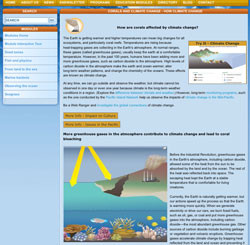What would a 7th grader do?
Joanna Woerner ·Chilling question when your middle school days are long behind you and you're reminded of just how not hip you are each time you put on the tv, the radio, or Google. Nonetheless, What would a 7th grader do? --has been the guiding question for the coral and climate change module IAN is developing for the Pacific Island Network Inventory and Monitoring Program at the National Park Service (NPS).
We've been spending a lot of time thinking like a middle school student--What would make me care about corals? What would make me care about climate change? What would make a website interesting to me? Clearly, there were many questions to be answered.
After consulting local teachers, NPS staff, and actual 7th graders, we established the following framework to shape the concepts and content of our web module on corals and climate change:
- What does this mean for me?
- Can you tell me how it works? --but don't make me feel dumb while you're telling me.
- If I click on it, will something cool happen?
We went forth with our framework. Everything we developed had to address these questions. When it comes to the web, perhaps you could argue the last question is the most important. So, we set out to make cool things happen. Cool things that would engage middle school students and let them explore the incredible biodiversity of coral reefs, collect valuable data about coral cover with the same methods researchers use, see into the future as unchecked carbon emissions increase ocean acidification and erode corals, and imagine how their daily lives would be different without coral reefs.

Soon, we'll get to see how good we were at impersonating young teenagers. Our partners at the College of Exploration are helping us host an online learning community where teachers from the Pacific islands of Hawaii, Samoa, and Guam will review our pages and test our classroom activities. They'll tell us if the module is engaging and if their students can learn about climate change through our videos, animations, conceptual diagrams, and games. We depend on this teacher feedback to help improve the delivery and content of the module. If the first principle of good communication is know your audience, then teachers are communication experts. They know when an activity will flop. They can tell when students will feel like they are being talked down to. They can read a room like a successful standup comic on a long summer tour. That's why science communicators enjoy working with teachers when developing science education products. Because even our best impersonation, could be a hard sell with the middle school crowd.

